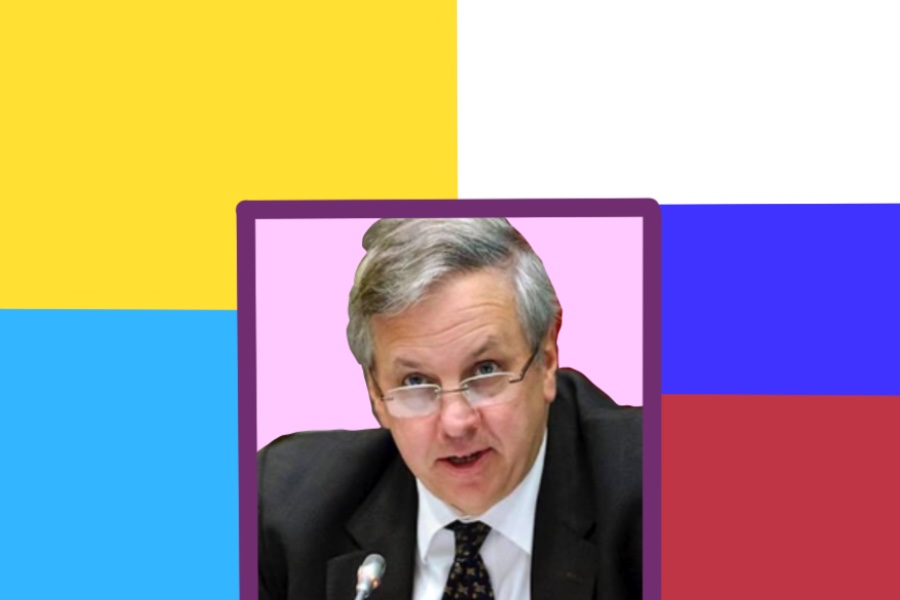Ambassador in Residence Ian Kelly discusses Putin, Russia-Ukraine crisis during Global Lunchbox
Ambassador-in-Residence Ian Kelly discussed next steps for the United States in the Russia-Ukraine crisis during Friday’s Global Lunchbox speaker event.
February 21, 2022
Ambassador in Residence Ian Kelly, former U.S. ambassador to Georgia, discussed the Russia-Ukraine crisis on Friday.
Kelly was the latest speaker at Global Lunchbox, which is a speaker series hosted by Political Science Prof. Ian Hurd. The series facilitates forums related to social sciences and international studies.
“Global Lunchbox conversations tackle everything from global events to academic controversies,” according to the website.
So far, the series has discussed topics like politics of the Middle East, the history of the American birth certificate and civil resistance.
According to the seminar, the presence of Russian forces in Ukraine began in 2014 when Russian military forces seized and annexed Crimea, a peninsula in the Black Sea, under direction from President Vladimir Putin. In recent weeks, Russia has deployed more than 100,000 troops to the border of Ukraine. This conflict has drawn international attention, as countries like the U.S. and the U.K. hope to prevent Russia from creating an international crisis.
In response to Putin’s movement into Russia, the U.S. has been discussing economic sanctions against Russian banks to cripple Russia’s economy and potentially deter Russian action in Ukraine. However, Kelly said Putin has already accounted for these potential sanctions, so they would likely not change Russia’s course of action.
“He has a huge rainy day fund or huge war chest because of high oil and gas prices that he set aside,” Kelly said. “I’ve seen people say that it’s … close to $700 billion. In the short term, I think they’re figuring that they can weather it.”
Kelly also discussed how Putin’s actions are often made unilaterally, without approval from other officials. In the former Soviet Union, Kelly said there was a bureaucratic process to approve certain actions.
“There’s nothing like that with Putin as far as we can see,” Kelly said. “I don’t think we know what he’s going to do, because we just don’t have … insight into what the decision-making process is there.”
Kelly said the crisis between Russia and Ukraine can be framed through the lens of Putin’s desire to re-establish and preserve a “sphere of influence” in Eastern Europe.
Hurd, summarizing the discussion so far, asked Kelly if Putin sees the nations of the world as either allied with the U.S. or allied with Russia.
“It sounds like … Putin is seeing basically a binary choice. Either attached to the U.S. or attached to Russia, and that’s sort of the full list of options. It’s a binary,” Hurd asked.
Kelly said he agreed, explaining that Putin wants to forestall the invitation of former Soviet Union countries Georgia and Ukraine to the North Atlantic Treaty Organization — a goal Kelly said has been successful.
Kelly also commented on the Biden administration’s public response to the crisis, disagreeing with Biden’s decision to publicly announce that the U.S. would not send ground troops to Ukraine.
“Why say that? Why not say all options are on the table? Why not keep Putin guessing?” Kelly said.
Kelly also noted the economic impact the conflict has already had and emphasized that Russian troops in Ukraine could continue to be deployed for a long time.
However, Kelly described one positive outcome of the Russia-Ukraine crisis: the nations of NATO are allied to prevent Putin from invading and attacking Ukraine.
“Everybody should thank Vladimir Putin for really reinforcing a unity in NATO,” Kelly said.
Email: gwensetia@u.northwestern.edu
Twitter: @GwenSetia
Related Stories:
— Chris Abani talks about identity and language in his memoir ‘The Face’
— Retired Col. Liam Collins: Russian withdrawal from Ukraine unlikely
— Alt: SWIFT sanctions will make Putin think twice about invading Ukraine



